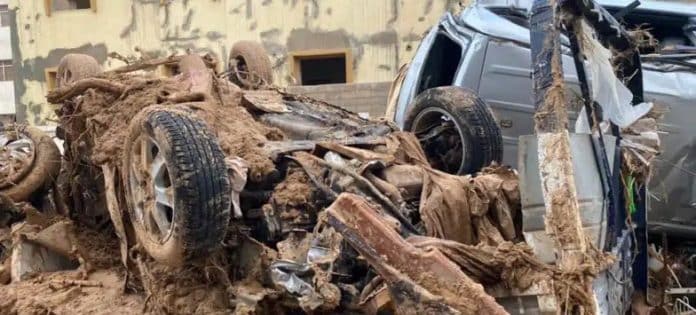The United Nations is providing aid to areas in eastern Libya after extreme rainfall caused devastating flooding and loss of life over the weekend, and has issued an urgent appeal to donors for $71.4 million.
More than 5,000 people have reportedly died and thousands more are reported missing, many of them residents of Derna after it was struck by a torrent of water from two dams which burst, sweeping away whole neighbourhoods of the port city.
UN aid coordination office OCHA on Thursday 15 September issued the flash appeal to respond to the needs of around 250,000 people impacted by the floods in Libya over the next three months, saying death tolls could rise without more help. OCHA estimates that more than 880,000 people, in five provinces, live in areas directly affected by the storm and flash floods.
A disaster assessment team has been deployed to support government response and relief operations, the UN announced on Wednesday.
“Search and rescue operations are actively underway, led by national agencies, military, the Libyan Red Crescent and local volunteers”, said a statement released by the UN Spokesperson’s Office.
Help ‘any way we can’
UN Secretary-General António Guterres expressed “my deepest condolences and my full solidarity with all those affected”. He told reporters in New York that the UN was ready to “work in any and every way we can with partners to help get emergency assistance to those who so desperately need it.”
The UN Resident and Humanitarian Coordinator in Libya, Georgette Gagnon, has tasked an emergency response team to support local authorities and partners.
A team from the Geneva-based UN Disaster Assessment and Coordination (UNDAC) operation, part of humanitarian coordination office OCHA, has been deployed to support response and relief operations.
Emergency Relief Coordinator, Martin Griffiths, announced on Tuesday an initial allocation of $10 million from the Central Emergency Response Fund (CERF) to support those affected by the floods.
Overcome political deadlock
Oil-rich Libya has in effect been split since 2014 between an interim, internationally recognised Government operating from the capital, Tripoli, and another one in the east, with many armed groups also operating on its territory. The two sides signed a ceasefire in 2020, but political rivalries continue.
UN human rights chief, Volker Türk, issued a statement on Wednesday calling on all Libyan political actors to overcome political deadlocks and divisions, “and to act collectively in ensuring access to relief.”
UN system in action
The UN World Food Programme (WFP) said on Wednesday it had despatched its first shipment of food assistance to Libya in the wake of the flood. More than 2,000 storm-affected and displaced people who fled from Derna to Benghazi have already received food and distributions are ongoing. WFP aims to reach more than 5,000 families in the coming days, and provide monthly food assistance to 100,000 people in flood-affected areas for the next three months.
UNICEF said it has provided medical kits and medical supplies for 10,000 people, as well as 1,100 hygiene kits and clothing kits.
The World Heath Organization (WHO) has deployed prepositioned aid supplies to the affected areas. WHO spokesperson Margaret Harris estimated that torrential rain affected up to 1.8 million people and damaged and even “wiped out” some hospitals.
Significant displacement is being observed across affected regions, most notably in Derna, where available data from the UN migration agency (IOM) indicates that at least 30,000 individuals have been displaced.
Libya has become a key springboard for migrants from over 40 countries heading for Europe, who most likely have also been severely impacted by the floods, IOM warned.
An international response
Six European Union Member States (Germany, Finland, France, Italy, the Netherlands, and Romania) have offered assistance consisting of an emergency medical team, search and rescue teams and equipment, heavy machinery, technical expertise and in-kind assistance (shelter, food and non-food items, power generators).
In addition, 500,000 euros in humanitarian aid funding was also mobilised by the EU to provide immediate lifesaving support to affected people in the area of Derna and other affected areas.
The United Kingdom has announced an initial package worth up to £1 million which will provide life-saving assistance to those in need.
See also:

